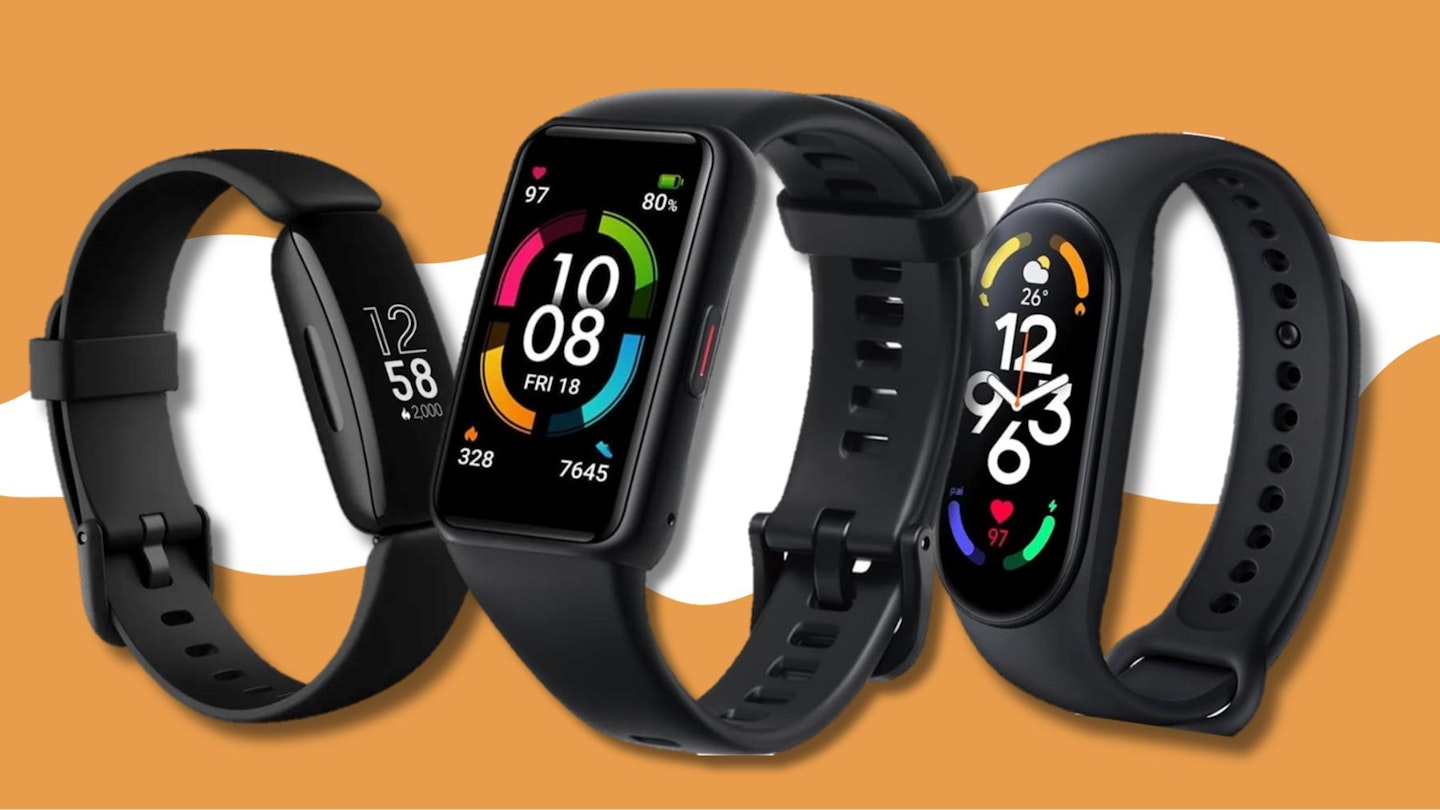If you’re looking for a way to experience the benefits of tracking your fitness without breaking the bank, then the best fitness tracker under £50 will help you. These inexpensive gadgets offer plenty of insights to help you monitor your health and fitness.
There are plenty of benefits to having a good fitness tracker: they can help track your activity, show you how close you are to hitting your goals, and keep you motivated and accountable. And while some of the best smartwatches for tracking your health don’t come cheap, the fitness trackers on this list still offer lots of features despite costing less than £50. Whether you're a beginner looking to kickstart a healthier lifestyle or a seasoned fitness enthusiast, these trackers can help you reach your goals.
The best fitness tracker under £50 at a glance:
A fitness tracker serves as your own mini personal fitness coach. It can provide real-time data on GPS, steps taken, and heart rate while encouraging regular exercise and a more active lifestyle. It can also help people stay accountable for their fitness routines, giving you a gentle nudge when you otherwise might not feel like it. Moreover, it provides motivation through goal setting and friendly competitions, fostering a sense of accomplishment.
From tracking daily steps to measuring heart rate, sleep quality, and even stress levels, trackers are versatile tools designed to empower you. They can help you take charge of your health, stay motivated and make informed decisions on your path to a fitter, healthier you. Join us as we explore the best fitness tracker for under £50 and embark on a journey to a more active and healthier lifestyle.
The best fitness trackers under £50
Please note: All prices are correct at the time of writing. Prices, stock and deals are subject to change without notice.
Best overall
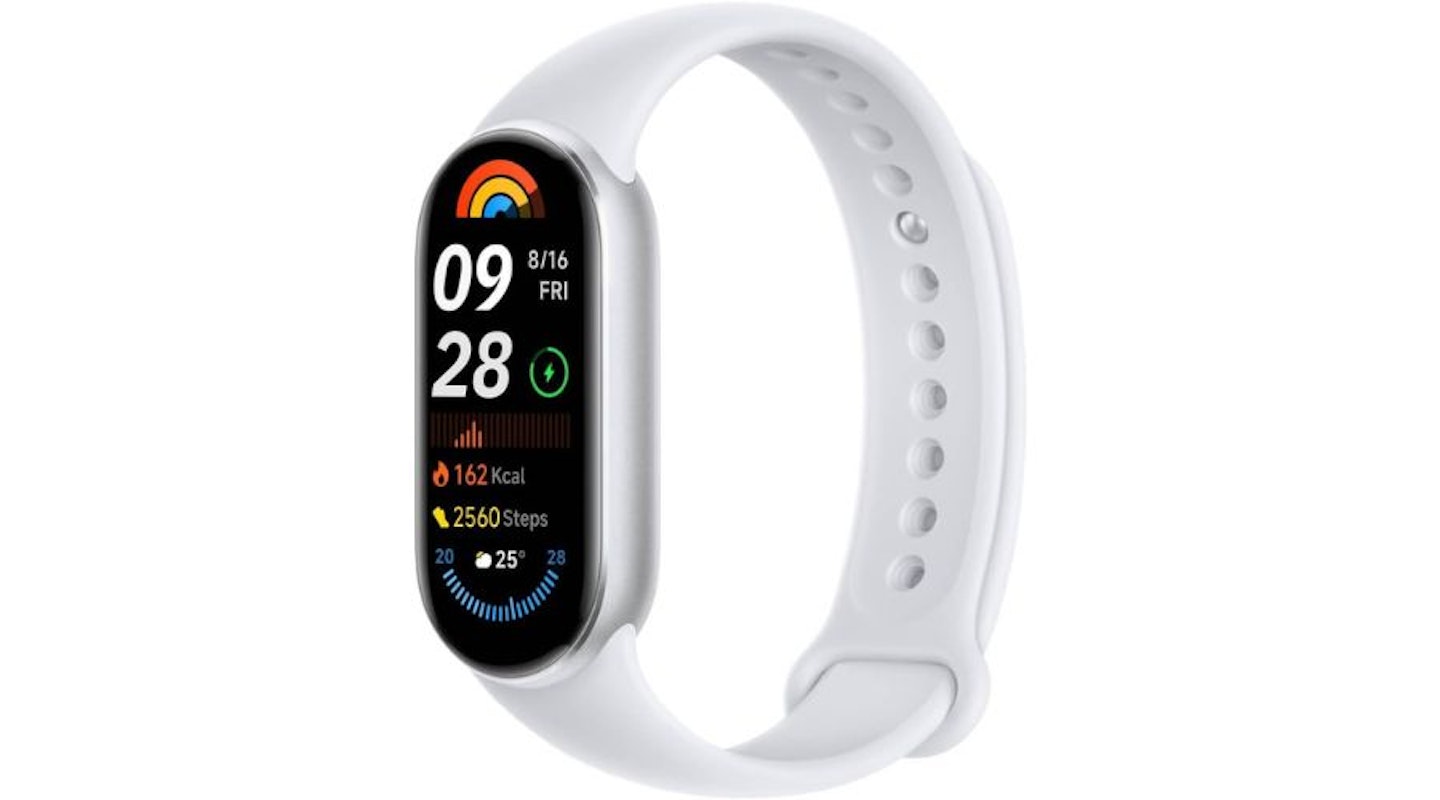 Xiaomi
XiaomiThe Xiaomi Smart Band 9 is the latest in Xiaomi's line of ultra-affordable fitness trackers. And the good news is that, despite being an improvement over its predecessor, it still comes in at the same RRP of £34.99. That makes this exceptional value, as well as one of the most feature-rich devices in this price bracket. The company also offers the Smart Band 8 Pro – one of the best fitness trackers under £100.
The Band 9 keeps plenty of the features that made the Band 8 so feature-rich. This includes heart rate and blood oxygen tracking, sleep and activity recording, and support for over 150 different sports and activity types. The 1.62-inch AMOLED is the same size as before, but this time, it can go twice as bright (up to 1200 nits). Battery life has also been extended, going from an already impressive 16 days to around 21 days between charges (obviously, this varies based on usage). Pebble Mode, which lets you put the tracker on your shoe via a special attachment (sold separately) has also been kept.
Arguably the biggest difference is under the hood, where new sensors claim to be significantly more accurate than the last model – around 16 per cent better at heart rate monitoring, for example. There's still no built-in GPS – which would be a real quantum leap for this price range. But the incremental improvements this device offers are enough to put it at the top of the pile.
Pros
- Extremely good value for money
- Pebble Mode is an excellent feature for runners
- Impressive battery life
Cons
- No built-in GPS
- Questions marks over accuracy
| Display: | 1.62-inch AMOLED, 192 x 490 pixels |
| Battery Life: | Up to 21 days |
| GPS: | Connected-GPS only |
| Water Resistance: | 5 ATM |
| Compatibility: | iOS and Android |
| Dimensions: | 46.53 x 21.63 x 10.95 mm |
| Weight: | 15.8 grams (without strap) |
Best Huawei fitness tracker under £50
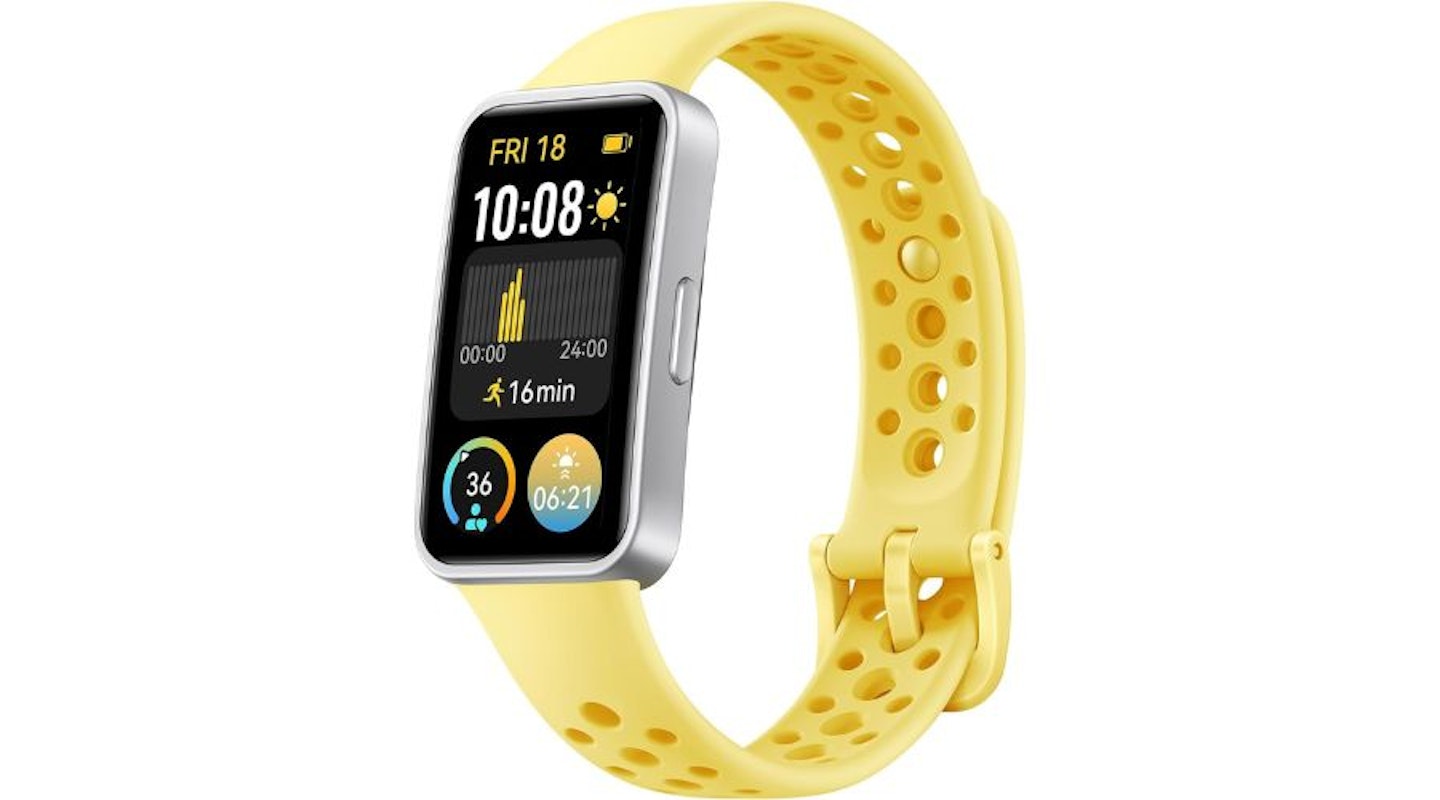 Huawei
HuaweiAnother device that comes in just under £50 (RRP £49.99) the Huawei Band 9 is Huawei’s latest affordable fitness tracker, and it packs plenty of features. The vibrant 1.47-inch OLED display is beautiful, and despite the generous screen size, it weighs just 14g.
It also has many health and fitness tracking features, including heart rate, blood oxygen, and sleep tracking. There’s also stress and women’s health tracking, including period reminders and fertility window predictions. The Band 9 claims to track over 100 different activity types, including swimming. One particularly useful feature for swimmers is the SWOLF metric, which measures swimming efficiency. This is all backed up by an impressive 14-day battery life.
There are also several smart features as well – call and text notifications, calendar, weather forecasts, and music control, to highlight a few. It’s a solid all-round package. There are a few omissions: it doesn’t have built-in GPS, and it isn’t as accurate as the best devices on the market. But typically, those devices are considerably more expensive.
Pros
- Beautiful AMOLED display is bright and clear
- SWOLF metric is particularly useful for swimmers
- Some smart features as well as health and fitness tracking
Cons
- No built-in GPS
| Display: | 1.47-inch AMOLED, 368 x 194 pixels |
| Battery Life: | Up to 14 days |
| GPS: | Connected-GPS only |
| Water Resistance: | 5 ATM |
| Compatibility: | iOS and Android |
| Dimensions: | 43.45 × 24.54 × 8.99 mm |
| Weight: | 14 grams, (without strap) |
3.
Oppo Band
Best budget fitness tracker under £50
 Oppo
OppoThe Oppo Band has now been superseded by the Oppo Band 2, meaning this version is more affordable than ever. With its RRP of £39.99, and often available for less, it’s one of the cheapest devices on our shortlist, but still offers a basic fitness tracker that all the essential metrics on board.
Heart rate and blood oxygen monitoring, sleep tracking, and the usual step, calorie and activity tracking are all available. The Oppo Band also tracks a dozen different types of exercise, has a Fat Burn Run mode to guide you to the ideal intensity level to burn fat during a run, and will even cope with a dip in the swimming pool. A few smart features include music control, call and message notifications, alarms, and weather forecasts.
The companion app is also simple and presents your data clearly. Of course, the Oppo Band will never be the most advanced or accurate device on the market. But then, again, for under £40, that’s not the aim. It’s designed to provide a simple fitness tracker that gives you all the essential metrics to understand your fitness patterns and behaviours. And it does that job to a more than satisfactory standard.
Pros
- Fat Burn Run mode may be useful for some runners
- Some additional smart features are useful
- Simple companion app
Cons
- Fewer metrics than on some more expensive devices
- Relatively small screen
| Display: | 1.1-inch AMOLED, 126 x 294 pixels |
| Battery Life: | Up to 12 days |
| GPS: | Connected-GPS only |
| Water Resistance: | 5 ATM |
| Compatibility: | iOS and Android |
| Dimensions: | 40.4 x 17.6 x 11.45 mm |
| Weight: | 10.2 grams (without strap) |
Best smartwatch-style fitness tracker

uk.amazfit.com
If you like the style of an Apple Watch, but don’t appreciate the price tag quite so much, then the Amazfit Bip 3 offers a similar rounded-square design, but still costs less than £50. It’s by no means a true smartwatch, but the vibrant 1.69-inch large display, you're able to easily see your incoming calls, messages, reminders and health information. You’re also good for up to two weeks of normal usage between charges.
Tracking-wise, this fitness tracker has you covered for heart rate, sleep, stress and blood oxygen metrics. There are 60 different sports modes, and it’s water-resistant enough to cope with a swim. Unusually for this price bracket, there’s even built-in GPS, making it easy to track runs, walks and bike rides without needing to take your phone with you.
The Bip 3 also incorporates a Target Pace function, which means you can set and beat your pace goals. Striking a balance between functionality and cost-effectiveness, the Bip 3 offers a featured-packed fitness tracker with plenty of customisable features for fitness enthusiasts of every level.
Pros
- Plenty of personalisation options, including over 50 watch faces to suit all styles and outfits
- Measures your blood oxygen levels in just 25 seconds to quickly understand your physical state
- Over 60 sports modes so you can get data for all your favourite sports, including yoga, running and cycling
- Built-in GPS is very rare under £50
Cons
- One reviewer found the accuracy of steps is a little off
| Display: | 1.69-inch, TFT touchscreen, 240 x 280 pixels |
| Battery Life: | Up to 14 days |
| GPS: | Built-in GPS |
| Water Resistance: | 5 ATM |
| Compatibility: | iOS and Android |
| Dimensions: | 44.12 x 36.49 x 9.65 mm |
| Weight: | 33 grams (without strap) |
5.
Honor Band 9
Best Honor fitness tracker under £50
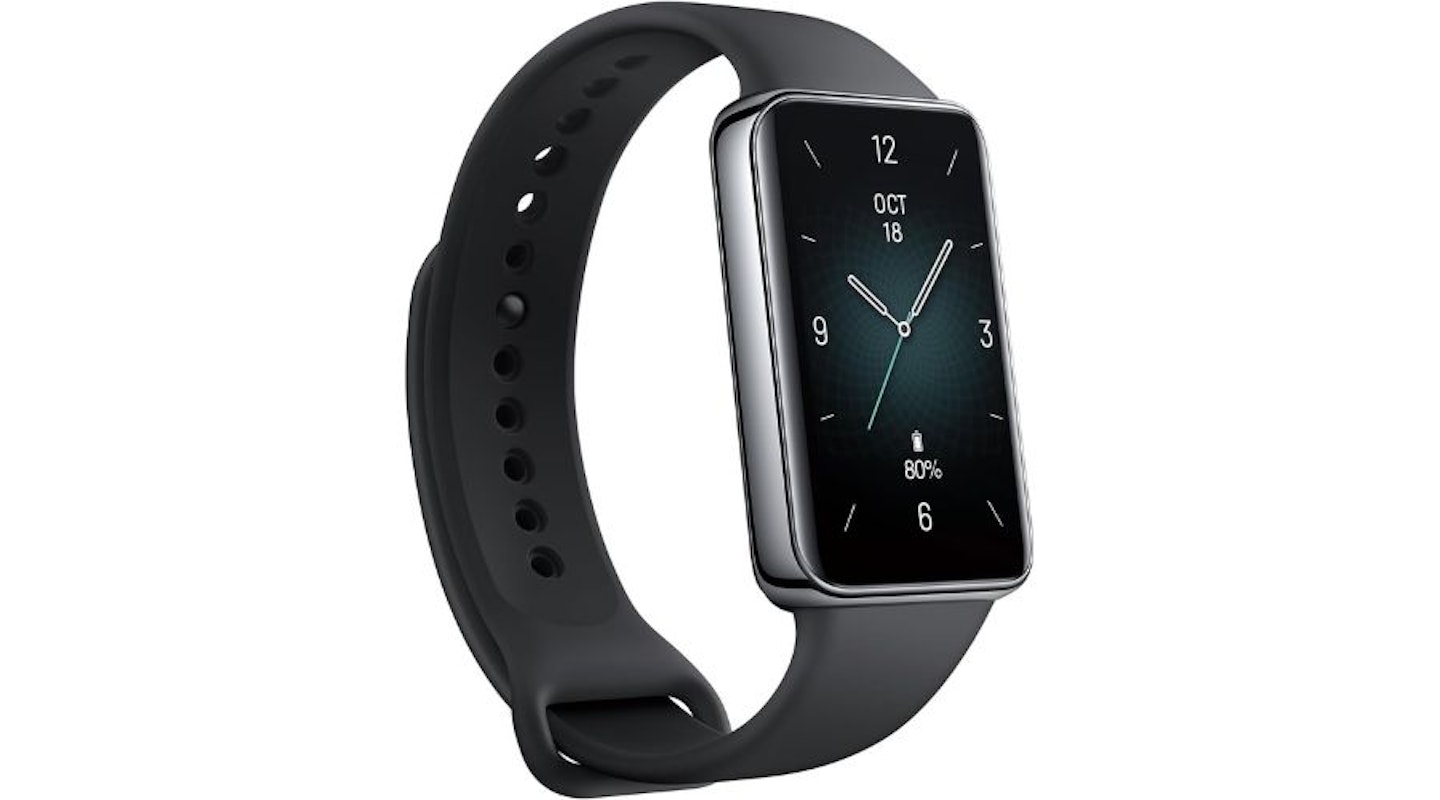 Honor
HonorThe Honor Band 9 has a lot in common with the Huawei Band 9, both in terms of features and its £49.99 RRP. The screen is slightly larger at 1.57-inches and makes reading notifications or using any of its tools extremely easy. If you like a large display, this will appeal.
It offers all the usual health and fitness metrics we’d expect – heart rate, blood oxygen, stress, sleep and menstrual cycle can all be tracked, while 96 sports modes mean you can track just about any activity you can think of. Honor has also introduced running workouts to add extra support to beginner runners. There are also estimates of your Fitness Age, to give you an idea of how fit you are. If you’re new to running, these may be extremely helpful.
Weather forecasts, music control, and notifications are all available, while 10-14 days (about 2 weeks) of battery life means you won’t need to worry about charging it every day. There’s no built-in GPS, and as with so many devices in this price range, it won’t be as accurate as other, more expensive models. But it offers all the essentials.
Pros
- Running workouts will help beginners
- 96 sports modes cover a wide range of activities
- Decent battery life
Cons
- Connected GPS isn't ideal
| Display: | 1.57-inch 256 x 402 pixels |
| Battery Life: | Up to 14 days |
| GPS: | 14 days |
| Water Resistance: | 5 ATM |
| Compatibility: | iOS and Android |
| Dimensions: | 43 × 27.88 × 9.49 mm |
| Weight: | 16.3 grams (without strap) |
Best Amazfit fitness tracker under £50
 Amazfit
Amazfitwww.very.co.uk
The Amazfit Band 7 has a more traditional lozenge-style design than the Bip 3 we highlighted earlier. But it still offers a generous 1.47-inch AMOLED display, which looks similar to a Huawei Band 7. Unlike some of its rivals, however, there’s no ambient light sensor, which means it won’t automatically adjust to bright light – you'll need to remember to adjust your brightness settings before going outside, as it can be very tricky to do once you’re outdoors in the sunshine.
Apart from that omission, you’re getting a well-stocked fitness tracker. With 18-day battery life (one of the best we’ve seen), the Amazfit Band 7 offers heart rate, blood oxygen stress, sleep and even nap tracking. It has 120 sports modes, and water resistance that lets you take it for a swim – with a dedicated Pool Swimming mode to provide swimming metrics. A Virtual Pacer function lets you race against yourself, while there’s a quick health check option that lets you check your heart rate, blood oxygen and stress all at the same time.
It’s got some smart features too, including built-in Alexa voice assistant, call and text notifications, weather controls, and much more. The Zepp companion app isn’t perhaps the most polished, and it’s another fitness tracker that lacks built-in GPS. But once more, for a device that costs less than £50, it’s well built, offers plenty of features, and is a good choice for anyone who’s just getting started.
Pros
- Alexa voice assistant built in
- Quick health check mode is a nice feature
- Virtual Pacer mode is great for running
Cons
- No ambient light sensor to automatically adjust brightness
- Zepp app isn't the most polished
| Display: | 1.47-inch AMOLED, 198 x 368 pixels |
| Battery Life: | Up to 18 days |
| GPS: | Connected-GPS only |
| Water Resistance: | 5 ATM |
| Compatibility: | iOS and Android |
| Dimensions: | 42.33 x 24.36 x 12.2 mm |
| Weight: | 28 grams |
7.
Fitbit Ace 3
Best for kids
 Fitbit
FitbitWhile it doesn’t have all the health and fitness features Fitbits for adults offer, the Fitbit Ace 3 still provides lots to help youngsters (aged six and upwards) keep track of their activity levels. The Ace 3 counts steps and tracks time spent being active and sleeping. It also reminds kids to get moving and offers badges, animated clock faces and avatars as rewards for being active.
Best of all, the companion app allows parents and children to keep track of their stats, without exposing children to potentially unwanted data such as calories burned. And while it’s suitable for kids from the age of six, its design means that it won’t start to look babyish as your child enters their teenage years, meaning that this should have some longevity.
Battery lasts up to eight days, while the interchangeable silicon strap helps protect the screen from damage and gives kids some choice over how it looks. If you want a basic fitness tracker to help encourage a child to get active, this has an RRP of £69.99, but is often available for less than £50.
Pros
- Durable, comfortable design
- Doesn't track calorie burn
- Helps motivate kids to be active
Cons
- Limited fitness tracking features
- Black and white screen is dull
| Display: | 1.4-inch OLED |
| Battery Life: | Up to six days |
| GPS: | No |
| Water Resistance: | 5 ATM |
| Compatibility: | iOS and Android |
| Dimensions: | 37.39 x 16.8 x 12.9 mm |
| Weight: | 28 grams |
Best fitness tracker under £50 from a traditional watch brand
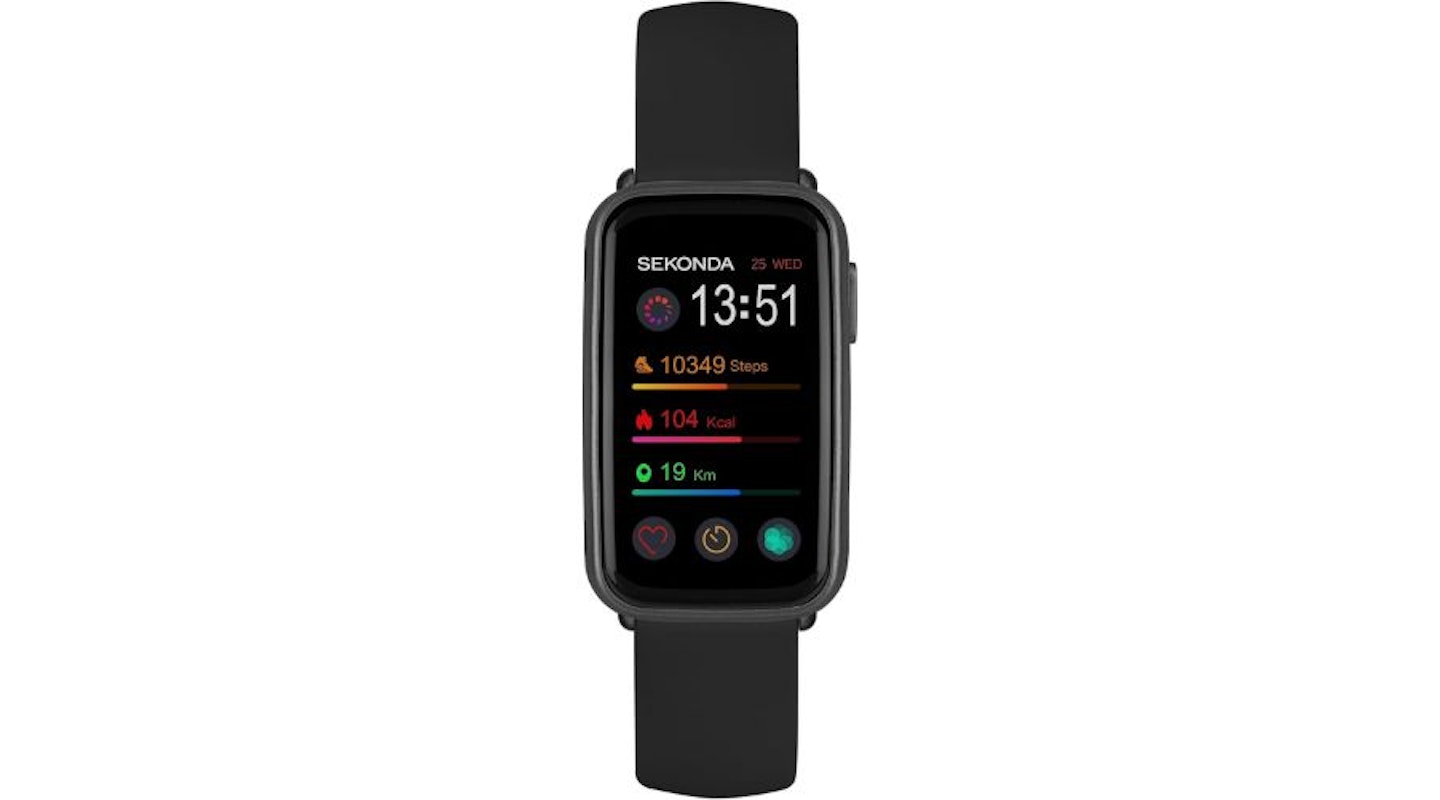 Sekonda
SekondaIf you'd prefer your fitness tracker to come from a brand that's been around for a few decades and still doesn't cost more than £50, then check out the Sekonda Track. Sekonda describes this as a smart watch, but the reality is it offers only a few smart features that put it much more in line with a fitness tracker. And for the RRP of £39.99, we'd have been surprised if it was a "true" smartwatch.
It offers the basics you would expect from a fitness tracker – step counting, heart rate, blood oxygen and sleep tracking, estimated calorie burn, plus eight sports modes. These include running, walking, football and tennis. There's even blood pressure measurement, which is extremely unusual. It can notify you if you've been sitting down for too long. The Sekonda Track has an IP68 water resistance rating. This means it's splashproof, but you are advised to take it off before going for a swim.
Smart features include message notifications for popular apps such as Facebook, WhatsApp, LinkedIn, and emails. You can check the weather forecast, control your music, and even control the camera shutter on your phone.
While this is never going to match the sophisticated smartwatches from the likes of Google, Apple and Samsung, it offers all the basic features we'd expect from a fitness tracker at this price point. A two-year warranty helps provide peace of mind.
Pros
- Blood pressure measurement is extremely rare, especially at this price
- Two year warranty for peace of mine
- Straps can be removed and replaced for personalisation
Cons
- Battery life of ten days, which is lower than others on our list
- Splash resistance is not as good as rival products which you can wear while swimming
| Display: | 1.47-inch, 172 x 320 pixels |
| Battery Life: | Up to 10 days |
| GPS: | No |
| Water Resistance: | IP685 ATM |
| Compatibility: | iOS and Android |
| Dimensions: | 10 x 43 x 26 mm |
| Weight: | Unspecified |
Buying guide: the best fitness trackers under £50
How do I choose a fitness tracker watch?
Choosing the right fitness tracker for you might require careful consideration of your specific needs, preferences and lifestyle. Think about a couple of these factors before taking the plunge and investing in the best fitness tracker.
Fitness goals: Start by determining your fitness goals. Are you primarily interested in tracking your steps or active periods of the day? Do you prefer to monitor your heart rate? Or are you taking part in specific sports activities? Different fitness trackers all offer different features, so identifying your goals will help you choose the one that aligns best with your objectives.
Design and comfort: There are so many different styles available when it comes to choosing a fitness tracker that suits your own. Consider the design and comfort of the watch, as well as whether the brand offers an interchangeable strap or watch face, so you can make the band as to your taste as you wish. Also invest in one that you'll feel comfortable wearing daily, as both comfort and aesthetics can impact your willingness to use it consistently.
Display: Have a think about the type and size of the display you'd ideally want your fitness tracker to have. Some watches have small screens, while others offer larger and touchscreen displays. Select one that you find intuitive and easy to navigate.
Battery life: Long battery life is always handy for continuous tracking, so ensure you're purchasing a fitness tracker that can last several days on a single charge.
Water resistance: If you're planning on using your fitness tracker during water-related activities, such as swimming or showering, opt for one with water resistance. Make sure to check each watch's water resistance rating to check it meets your needs.

FAQ: the best fitness trackers under £50
Why should I invest in a fitness tracker?
Investing in a fitness tracker can be a wise decision for a couple of reasons. Firstly, it provides you with real-time data on your physical activity, helping you set and achieve fitness goals more effectively. It acts as a constant motivator by tracking your progress and reminding you to stay active.
Additionally, fitness trackers monitor essential health metrics like heart rate and sleep patterns, offering an insight into your overall well-being. On top of all this, they foster accountability, as you can review your daily activity and make adjustments to improve your health and fitness levels. Overall, a fitness tracker can make for a great addition to enhance your fitness journey, keep you on track and promote a healthier lifestyle.
Which is more accurate, a fitness tracker or the iPhone?
Both fitness trackers and the iPhone have their strengths when it comes to accuracy, but they serve different purposes. Fitness trackers, designed explicitly for health monitoring, often provide more precise data for metrics like heart rate, sleep quality and step counting due to their specialised sensors. iPhone's, although sometimes equipped with sensors like accelerometers, may not be as accurate for continuous monitoring. Phones also lack the PPG sensors that are used for continuous heart rate, sleep, and blood oxygen monitoring, and you’re also unlikely to stray one to your wrist – it simply wouldn’t be practical.
The accuracy of both devices also depends on factors such as device quality, sensor technology and software algorithms. So in general, for specific health tracking purposes, like continuous heart rate monitoring during workouts, fitness trackers are your best bet for accuracy.
Summary: the best fitness trackers under £50
It – almost – goes without saying, but the best trackers under £50 are best suited to people who are just starting out on their fitness journey, or just want a basic guide to their health and fitness data. These devices are among the most affordable fitness trackers, and don’t have the same sophisticated tech as the best Garmin watches, for example. More expensive models often have more advanced sensors, and are likely to offer more accurate data, and more insightful metrics.
You’ll also likely find that there are some features that don’t tend to be available at this price point. Built-in GPS, for example, tends to be found on more expensive devices (with the notable exception of the Amazfit Bip 3) such as the Fitbit Charge 6 or Garmin Forerunner 255, to give a couple of examples. Your exercise routine will dictate whether features like that are important or not, and whether it’s then worth investing a little bit more, to get the right device for you.
But that doesn’t mean a £50 fitness tracker is a waste of time and money. As we said before, these are a great introduction to keeping track of your health and fitness, before committing to something that might cost significantly more. They’ll still allow you to track trends and changes over time. You’ll be able to see whether your activity levels are helping improve your fitness, or whether you may need to make some adjustments, for example.
How we chose:
When selecting our shortlist, we looked for devices from well-known brands who have a proven track record. We considered price as the first point, and ruled out any devices that we haven’t seen on sale for less than £50. While there are one or two selections that have been more expensive than this, we know they’ve been available for less on more than one occasion.
In addition to price, we considered factors such as design, features, and performance. Did these fitness trackers offer the essential metrics we’d expect to find in any device worthy of the name? Did any have other features that make them worth highlighting? How good is battery life? What additional support does the companion app offer?
After considering all this information, we then put together our top picks for the best fitness trackers under £50.
Why should you trust us?
At What's The Best, our mission is to provide accurate and reliable reviews, ensuring our readers receive honest and transparent information about the best technology products available. Anything less would undermine our commitment to being a trusted source of unbiased product information.
Our dedicated in-house writing team comprises experts with extensive experience and a genuine passion for technology. Collectively, we have spent decades testing and writing about tech, leveraging our expertise in all our articles, advice pieces and reviews.
We maintain complete editorial independence and do not accept payment for product reviews. Our writers have full control over their content, ensuring that products are selected based solely on the needs of our readers. While we may earn commissions or other compensation from links on our website, this never affects our product choices. These links enable us to continue offering valuable consumer advice, without compromising the integrity of our reviews.
Steven Shaw is a Senior Digital Writer covering tech and fitness. Steven writes how-to guides, explainers, reviews and best-of listicles covering a wide range of topics. He has several years of experience writing about fitness tech, mobile phones, and gaming.
When Steven isn’t writing, he’s probably testing a new smartwatch or fitness tracker, putting it through its paces with a variety of strength training, HIIT, or yoga. He also loves putting on a podcast and going for a long walk.
Subscribe to the What’s The Best Newsletter to keep up to date with more of the latest reviews and recommendations from the rest of the What’s The Best team.
